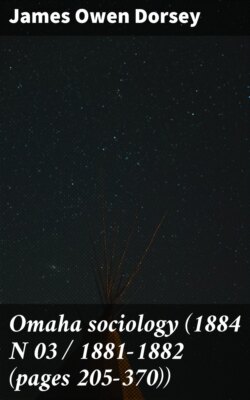Читать книгу Omaha sociology (1884 N 03 / 1881-1882 (pages 205-370)) - James Owen Dorsey - Страница 15
На сайте Литреса книга снята с продажи.
RULES FOR PITCHING THE TENTS.
Оглавление§ 11. Though they did not measure the distances, each woman knew where to pitch her tent. Thus a [K]anze woman who saw a Wejincte tent set up, knew that her tent must be pitched at a certain distance from that part of the circle, and at or near the opposite end of the road or diameter of the circle. When two tents were pitched too far apart one woman said to the other, "Pitch the tent a little closer." Or, if they were too close, she said, "Pitch the tent further away." So also if the tents of neighboring gentes were too far apart or too close together. In the first case the women of one gens might say, "Move along a little, and give us more room." In the other they might say, "Come back a little, as there is too much space between us." When the end gentes, Wejincte and Ictasanda, were too far apart there was sometimes danger of attacks of enemies. On one occasion the Dakotas made a dash into the very midst of the circle and did much damage, because the space between these two gentes was too great. But at other times, when there is no fear of an attack, and when the women wish to dress hides, etc., the crier said: "Halloo! Make ye them over a large tract of land." This is the only occasion when the command is given how to pitch the tents.
When the tribe returned from the hunt the gentes encamped in reverse order, the Wejincte and Ictasanda gentes having their tents at the end of the circle nearest home.
There appear indications that there were special areas, not only for the gentes, but even for the subgentes, all members of any subgens having their lodges set up in the same area. Thus, in the Iñke-sabě gens, there are some that camped next the Wejincte, and others next the Hañga; some of the Hañga camped next the Iñke-sabě, and others next the ₵atada, and so on. (See § 73.)
§ 12. Within the circle were placed the horses, as a precaution against attacks from enemies. When a man had many horses and wished to have them near him, he generally camped within the circle, apart from his gens, but this custom was of modern origin, and was the exception to the rule.
